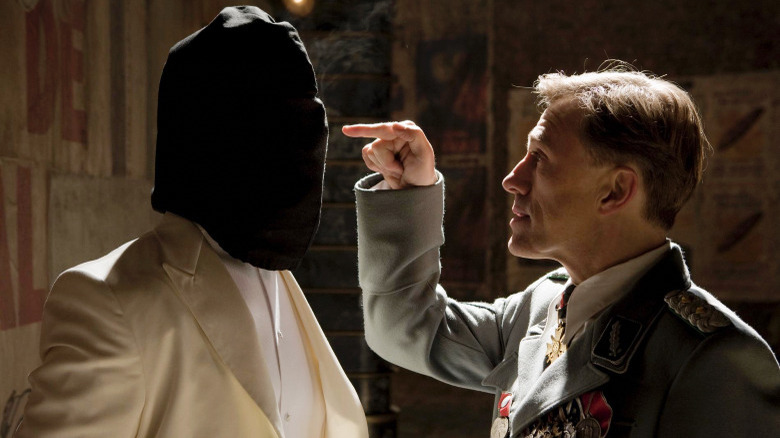Why Quentin Tarantino Nearly Gave Up On Inglourious Basterds
"Inglourious Basterds" is perhaps the best of the three revisionist historical revenge movies Quentin Tarantino has directed so far (assuming you don't count "The Hateful Eight" as the fourth), and it might even be his masterpiece — to paraphrase one of the film's most famous lines. From the painterly shot compositions by Tarantino's longtime cinematographer, Robert Richardson, to its many great quotes and the way it uses cinema as a (in the context of the movie, very literal) weapon to right the wrongs of history, there's plenty to admire in the filmmaker's genre-blending WWII pastiche.
Of course, any discussion of the film would be incomplete if it didn't touch upon Christoph Waltz's Oscar-winning turn as SS officer Hans "The Jew Hunter" Landa, a villain who can make an act as innocuous as politely asking to be invited into a cottage and requesting a glass of milk seem utterly menacing. It's hard to envision anyone else embodying the off-beat, despicable Nazi as well as Waltz did and even harder to imagine "Inglourious Basterds" working nearly as well without him. In fact, had Tarantino not auditioned Waltz for the role, the movie might not have happened at all.
As the filmmaker explained during an appearance on the "Moment" podcast in July 2021 (via The Playlist), he really struggled to find the right actor for Landa. This culminated in an emergency phone call meeting between Tarantino, his casting director, his casting agent, and his frequent producer Lawrence Bender, in which Tarantino told the others (in his own words):
"Look, guys, we're not finding [Landa] and I'm not so confident we're going to find him. I don't want to make the movie if we can't make the perfect Landa. Now, this isn't as cavalier as it sounds. It's a WWII movie, WWII isn't going anywhere, so we can just wrap up our box and put it away and three years from now... [we could do it]. I'm not gonna throw it away, but it's a WWII movie and we could do it three years from now and it'll be a different group of actors and maybe we'll have better luck."
That's a bingo!
Among the actors Tarantino considered for the role of Landa — prior to casting Waltz promptly after said emergency call — was Leonardo DiCaprio, who would go on to play another memorably vile character in the filmmaker's "Django Unchained." However, in Tarantino's eyes, DiCaprio just didn't fit the part for a simple reason: He wasn't fluent in French, German, and Italian like Landa is in the movie (and Waltz himself is), which Tarantino saw as an absolute necessity to bring the antagonist properly to life.
Tarantino actually talked about this when he hosted a special screening of "Pulp Fiction" at the 2016 Jerusalem Film Festival, explaining that Landa's "linguistic genius" was the key to him understanding who the character is (at his core) while he was writing the "Inglourious Basterds" script:
"When I wrote the scene in the opening, in the farmhouse, I didn't know yet that Colonel Landa was a linguistic genius, but during the course of writing the script, he became a linguistic genius. No matter what character came in the room, he could kick it to them in their language and speak it really well. He's not shown doing it, but he's probably one of the only Nazis in cinema history who could speak Yiddish, perfectly."
There are other factors one could validly point to as being part of what made Waltz a better fit for Landa than DiCaprio. Obviously, Waltz being mostly unknown among U.S. audiences when "Inglourious Basterds" came out in 2009 meant they wouldn't associate him with his earlier movie roles on some level — even a subconscious one — the way they would've with DiCaprio. That certainly didn't hurt Waltz's efforts to leave an impression in the film.
For me, though, the thing that makes Waltz perfect for the role is the weird energy he brings to basically every part he plays on-screen (which, to be fair, has since proven to be a doubled-edged sword for the actor over the years). It's one thing to have Landa mess up a colloquial phrase like "Bingo!" by saying "That's a bingo!" and play it for laughs. But the way Waltz delivers that notable line, it's funny in a way that's also deeply awkward, even if you didn't know or were somehow able to briefly forget that Landa is a murderous Nazi scumbag. That, in a nutshell, is why not just the character, but also so much of "Inglourious Basterds" works as well as it does.

